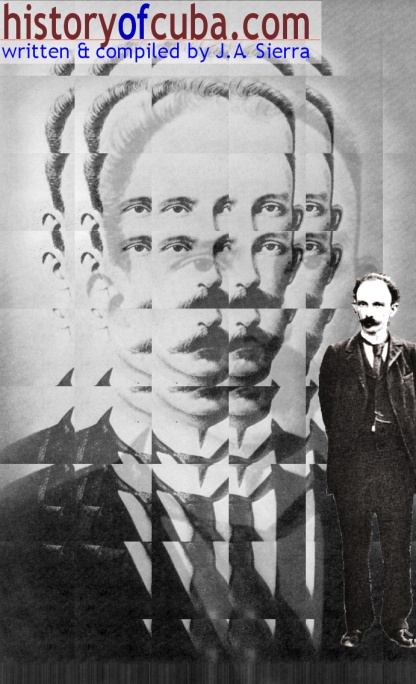The Writings of Martí at historyofcuba.com
Some of the most popular written works by Cuban icon José Martí are available in English at historyofcuba.com, including his most quoted essay, “Our America,” and other major articles such as “My Race” and the “Montecristi Manifesto.”
 I began reading Marti as a child in Cuba, but lost him to the winds when my family moved the US in the late 1960s. It would be almost twenty years before I would re-discover him at the Santa Monica library, where a tattered version of a long, out of print “Works of Marti” sat on a shelf, dusty and ignored.
I began reading Marti as a child in Cuba, but lost him to the winds when my family moved the US in the late 1960s. It would be almost twenty years before I would re-discover him at the Santa Monica library, where a tattered version of a long, out of print “Works of Marti” sat on a shelf, dusty and ignored.
Poet, teacher, organizer, and revolutionary are just some of the ways that José Martí is described by those familiar with his life and works. Killed in battle against the Spanish empire during Cuba’s war of independence in 1895, Martí left a body of work that speaks to this day about the hopes and aspirations of Cuban society.
Now you can read a selection of his major works in English at historyofcuba.com, including a number of articles and letters that will clarify beyond a doubt what it was that Martí hoped and fought for in Cuba. In my main article on Marti I wrote that he is “all things to all people,” and that has not changed with the times. What follows is a list of works available at the site:
OUR AMERICA, perhaps his most quoted essay, was first published in La Revista Ilustrada de Nueva York (January 1, 1891) and later in Mexico (March 5, 1892). This is where Martí’s thoughts on the relationship between the US and Cuba are expressed. “Our own Greece” he writes, “is preferable to the Greece that is not ours; we need it more. Statesmen who arise from the nation must replace statesmen who are alien to it.” It was Martí’s contention that Cuba’s future government should adapt itself to the needs of its people, and that Cuba should not look to imitate existing governments, but define its own.
MY RACE, published in PATRIA, the official newspaper of the Cuban Revolutionary Party (April 16, 1893), conveys the idea of Cuba as the society of racial harmony and true fraternity between Cubans.
The MONTECRISTI MANIFESTO, signed by Martí and General Máximo Gómez before they sailed to Cuba to fight against Spain, sets forth the goals, ideals and policies under which the war for separation from Spain was to be fought.
Also available is THE CUBAN REVOLUTIONARY PARTY, which sets forth the party’s agenda, and various letters written to General Antonio Maceo. In one of these letters, written during the planning of Cuba’s war for independence from Spain (June 18, 1894) Martí expresses his fondness for Flor Crombet: “Flor leaves a very pleasant impression upon me. I had not written to him as I should have done, nor was it necessary, as the interview proved. You two will go hand in hand. Fortunately, you will have nothing to impede your progress.”
And not to be missed is Marti’s controversial letter General Máximo Gómez in 1884, in which he resigned from the Revolutionary Movement, and his unfinished letter to Manuel Mercado (Martí died in battle before he could finish writing it).
historyofcuba.com features complete biographical information on José Martí, including the Martí Timeline, a full-length article, excerpts from various books and restored photographic images.
Articles by José Martí:
- OUR AMERICA – http://historyofcuba.com/history/marti/America.htm
- OUR IDEAS – http://historyofcuba.com/history/marti/OurIdeas.htm
- ANTONIO MACEO – http://historyofcuba.com/history/marti/martimac.htm
- MY RACE – http://historyofcuba.com/history/race/MyRace.htm
- THE CUBAN REVOLUTIONARY PARTY – http://historyofcuba.com/history/marti/Party.htm
- PLATFORM OF THE CUBAN REVOLUTIONARY PARTY – http://historyofcuba.com/history/marti/platform.htm
- THE ORDER TO REVOLT - http://historyofcuba.com/history/marti/revolt.htm
Letters by José Martí:
-
To Antonio Maceo:
- July 20, 1882 - http://historyofcuba.com/history/marti/MaceoLt1.htm
- June 18,1894 - http://historyofcuba.com/history/marti/MaceoLt2.htm
- June 22, 1894 - http://historyofcuba.com/history/marti/MaceoLt3.htm
- July 19, 1895 - http://historyofcuba.com/history/marti/MaceoLt4.htm
- To Maximo Gómez - http://historyofcuba.com/history/marti/ToGomez.htm
- To Manuel Mercado - http://historyofcuba.com/history/marti/mercado.htm /Marti was killed in battle (May 19 1895) and was not able to finish this letter to his friend in Mexico.
- Last letter to his mother - http://historyofcuba.com/history/marti/Mother.htm
Articles About Martí:
- The José Martí Timeline – http://historyofcuba.com/history/marti/jmtime-1.htm
- Books about Marti– http://historyofcuba.com/history/marti/marti5.htm
- José Martí Biography– http://historyofcuba.com/history/marti/marti.htm
- The José Martí Portal – http://historyofcuba.com/history/havana/Marti.htm
